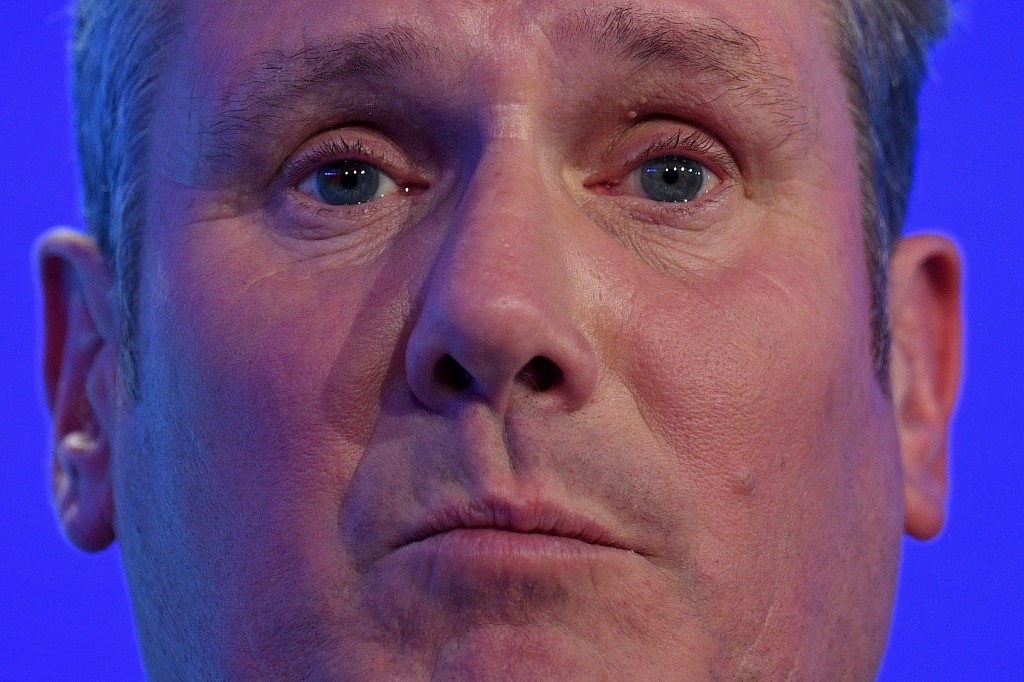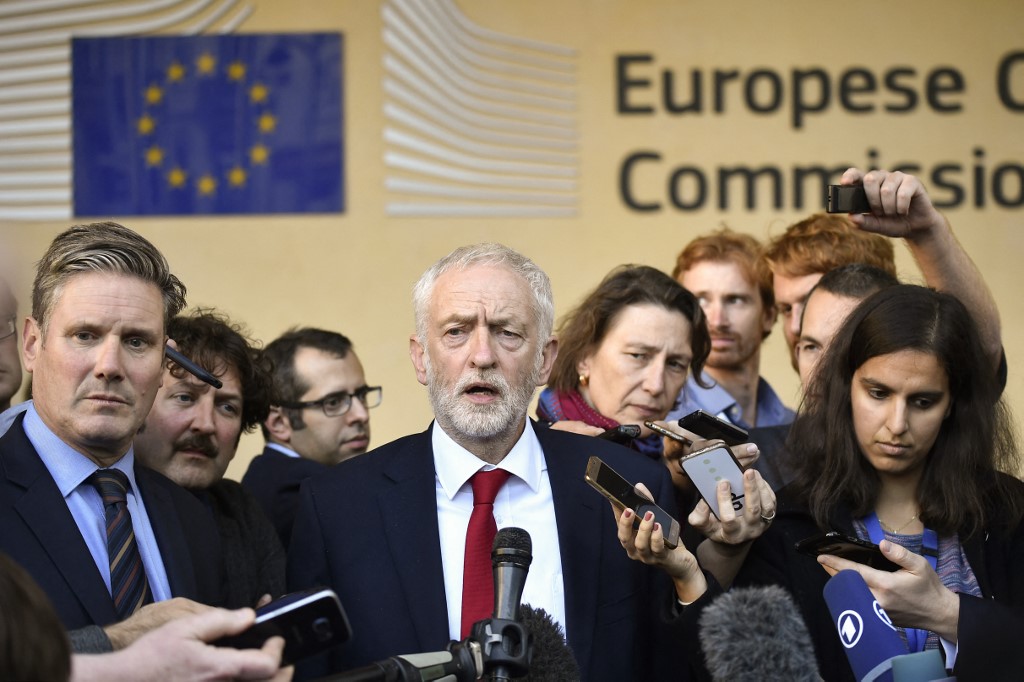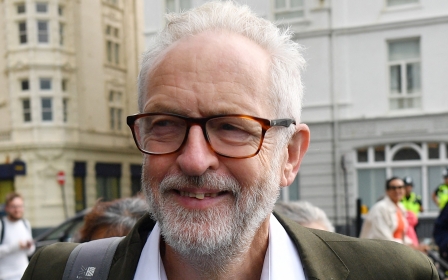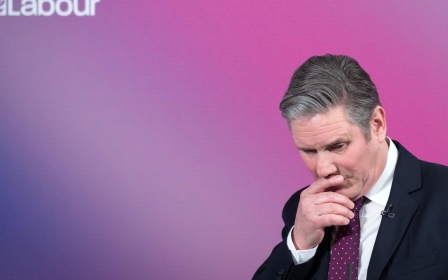Is Keir Starmer on a mission to kill off progressive politics in the UK?

Many members of the UK Labour Party - especially those who have been suspended or expelled - have been mystified as well as enraged by the behaviour of Sir Keir Starmer, who replaced Jeremy Corbyn as leader in 2020.
How did a young socialist of working-class origins end up espousing policies barely distinguishable from those of his Conservative opponents?
How did the fledgling lawyer deeply critical of paramilitary policing methods in 1986 work tirelessly in later years to shield the police from prosecution?
How could an experienced human rights lawyer declare himself a "committed Zionist", not only allying himself with a regime which has for decades violated international law, but pursuing relentlessly anyone in the party critical of such violations?
Oliver Eagleton’s book The Starmer Project: A Journey to the Right provides some clues.
New MEE newsletter: Jerusalem Dispatch
Sign up to get the latest insights and analysis on Israel-Palestine, alongside Turkey Unpacked and other MEE newsletters
He gives us a detailed account of Starmer’s career from human rights lawyer to politician to the leadership of the Labour Party. The trajectory is not a steady progression to the right but one full of contradictions, reversals and hesitations.
Eagleton describes how early in his legal career, Starmer played a leading role in the Haldane Society of Socialist Lawyers- though fellow Haldane member Bill Bowring remembers Starmer as being uncomfortable with the designation of the Haldane Society as “socialist”, wishing to change the term to “progressive”.
He worked pro bono for organisations such as Greenpeace against the fast-food giant McDonald's and contributed to a scathing report on police brutality in Northern Ireland, much to the fury of the right-wing media.
Enraged and humiliated
Eagleton suggests Starmer's five-year tenure as head of the Crown Prosecution Service from 2008 was pivotal in his political transformation. The CPS is the body that oversees public prosecutions in England in Wales, and some former colleagues were surprised that someone who had acted in many ways as an opponent of state power should now become an enforcer.
According to Eagleton, when director of the CPS, Starmer came to work closely with the UK Conservative-Liberal Democrat coalition government under David Cameron's leadership. He took a hard line against activists, in effect criminalising peaceful forms of protest. The result was that in a number of cases where protesters were charged with "violent disorder", the defendants ended up being acquitted on all counts.
Even in the face of compelling evidence, such as in the “Spy cops” scandal, where undercover police officers infiltrated activist groups, acting as agents provocateurs, no proper investigation was undertaken.
In 2021, The Guardian reported that a group of environmentalist activists have urged Starmer to give evidence to the undercover policing public inquiry to “get to the truth about non-disclosure, prosecutions and miscarriages of justice that involved undercover police officers”.
From 2011 to 2012, the Guardian published a series of articles (such as Rob Evans and Paul Lewis, Guardian, 7 June 2011) showing that the CPS under Starmer had in fact concealed evidence that would have exposed the activities of the undercover cops. Subsequently, the CPS was forced to drop charges and many previous convictions were quashed.
Starmer, then director of public prosecutions, approved a decision not to prosecute any police over the unlawful killing at Stockwell tube station of the Brazilian Jean Charles de Menezes, despite ample eyewitness testimony and video footage.
Eagleton describes how on the international scene, Starmer worked with foreign judicial institutions on issues like terrorism and migration offences and developed an especially close relationship with his opposite number in the US - Barack Obama’s attorney general, Eric Holder.
Whenever the US sought to extradite a British citizen, Starmer was eager to oblige. The most notorious case was that of Gary McKinnon, a young autistic UFO enthusiast, who managed to hack into a US military database he thought might store information on the topic.
Whenever the US sought to extradite a British citizen, Starmer was eager to oblige
Eagleton quotes McKinnon’s mother, who appealed desperately in person to Starmer as head of the DPP, when her son had been hounded through the courts for four years. She said: "There was no trace of understanding.” His response was simply "Speaking to you is making me feel very uncomfortable."
McKinnon was on the point of being extradited to a 70-year jail sentence in the US when Theresa May, the then Conservative home secretary, intervened to halt the process on the grounds that the move would be "incompatible with Mr McKinnon’s human rights".
Enraged and humiliated, Starmer immediately flew to Washington to apologise in person to Holder.
Similarly, he fought assiduously for the extradition to the US of Julian Assange of WikiLeaks fame, now languishing in Belmarsh prison with his case still unresolved after more than 10 years.
Servant of the security state
Starmer often claims that his role in the CPS was one of fearless independence - although, at the time, only 21 percent of his own staff considered his actions to be "consistent with the CPS's values".
In fact, Eagleton makes a convincing case that under Starmer the CPS became virtually an arm of the British security state. Certainly, his experience there and his close connections with centres of political power made his move to a political career a natural progression.
When Starmer was given a safe seat in a London constituency in 2015, he was an unknown quantity to most of the membership, having only recently joined the party. He seemed a rather dull figure, passionate only in his opposition to leaving the European Union.
Running for leader, he was touted as a reliable bureaucrat with a sharp legal brain, someone who could unite the party after the pitiless hounding of Corbyn with now clearly false charges of antisemitism.
Since he promised not only to reunify the party but also made “10 pledges” to support the socialist policies agreed upon in the previous party conference, many voted for Starmer with a feeling of relief.
The sense of betrayal was therefore all the greater when the new leader rapidly reneged on virtually all his pledges and achieved "unity" by ruthlessly purging or intimidating all dissenting voices.
Tendency to vacillate
That he was capable of such duplicity should have been clear to anyone who followed the lead-up to the disastrous 2019 election. Eagleton gives a detailed analysis of the internal wrecking operation that Starmer engineered following Labour's near win in 2017.
The party leadership was aware that Brexit was a potentially lethal issue and it was agreed rather to emphasise Labour's policies of public ownership.
Eagleton describes how after working behind the scenes with anti-Corbyn groups, Starmer was nevertheless able to manoeuvre Corbyn into agreeing reluctantly to a second referendum option. At the 2018 party conference, Starmer delivered the coup de grace. He had agreed not to mention the remain option, but then made it the centrepiece of his speech, with ultimately disastrous results in the following election.
According to the book, as one Corbyn aide put it succinctly, Starmer had “completely fucked us”. In retrospect, it is clear that a contest between two such politicians - one, a man of ruthless ambition, backtracking and plotting behind the scenes; the other a man of transparent and consistent principles - was an unequal match.
Eagleton points out that Corbyn's final excision from the party demonstrates both Starmer's tendency to vacillate and his vulnerability to pressure from centres of power. The decision of the Labour Party's ruling body, the NEC, to reinstate Corbyn in 2020 was initially approved by Starmer. But under pressure from the staunchly Zionist Board of Deputies of British Jews and the Jewish Labour Movement, the leader reneged on his decision.
After further internal wrangling, Starmer changed his mind - twice - but in March this year finally declared that Corbyn was banned from standing as a Labour candidate.
Enigma
As a human being, Starmer remains an enigma. Who can tell what he believes or stands for?
Clearly not happy with the cut and thrust of political life, he could have continued with a distinguished and less stressful career in the law. Even his closest supporters are nervous about his inability to inspire the electorate or to inflict real damage on a Conservative government mired in sleaze and incompetence.
But he has succeeded in dealing a crushing blow to progressive politics in the UK, possibly for the best part of a generation.
The views expressed in this article belong to the author and do not necessarily reflect the editorial policy of Middle East Eye.
Middle East Eye delivers independent and unrivalled coverage and analysis of the Middle East, North Africa and beyond. To learn more about republishing this content and the associated fees, please fill out this form. More about MEE can be found here.








